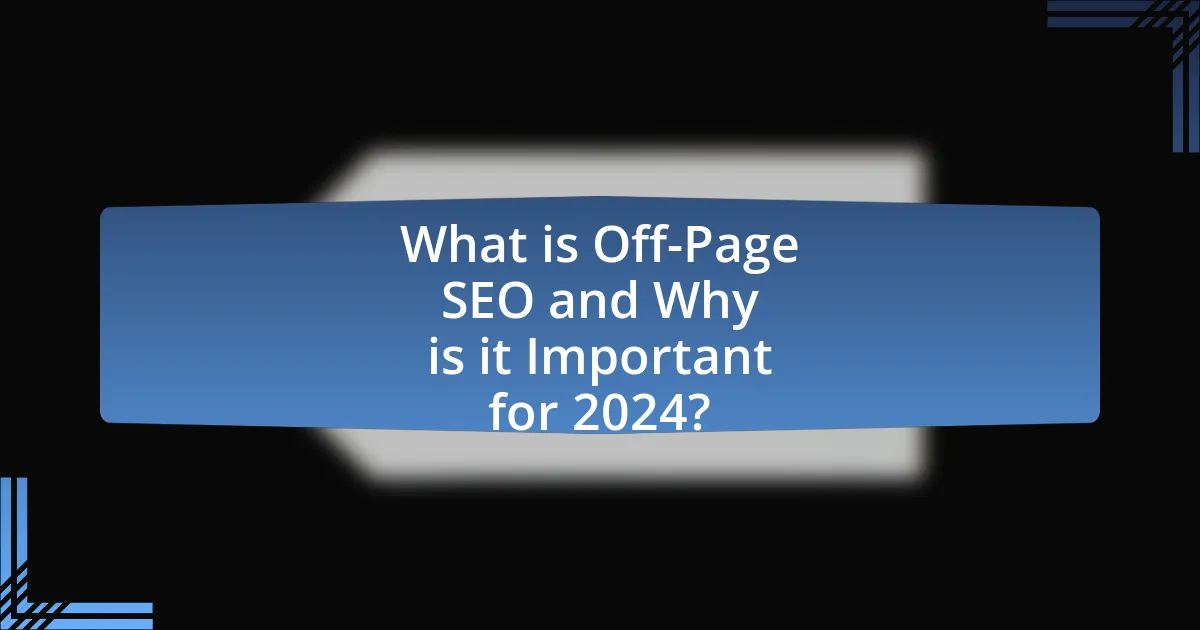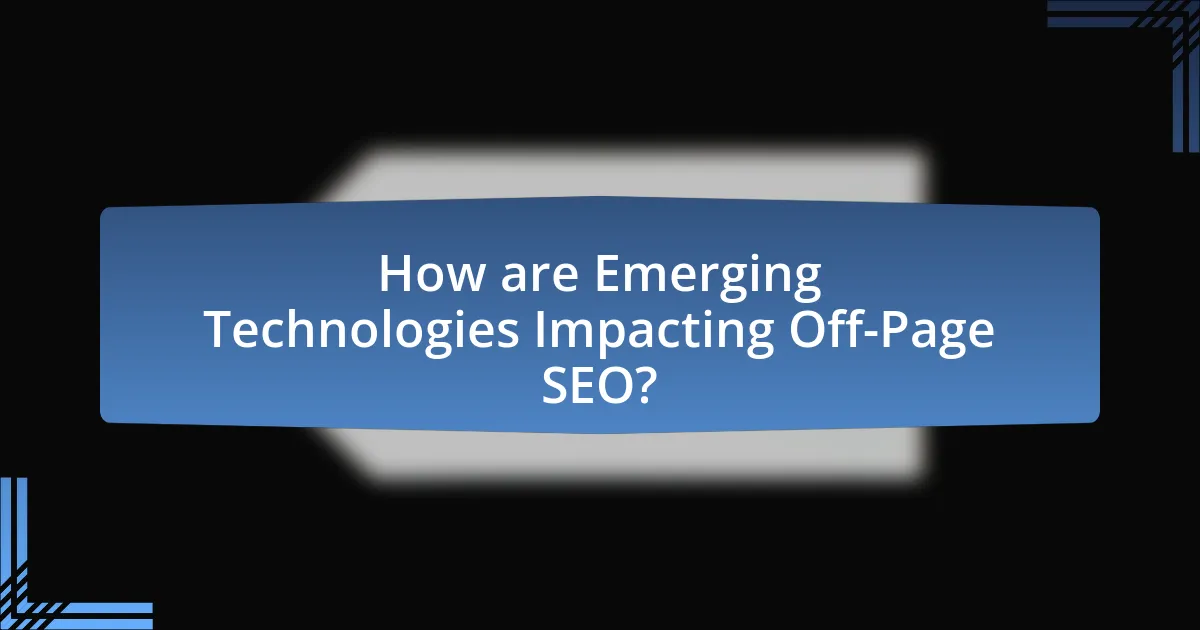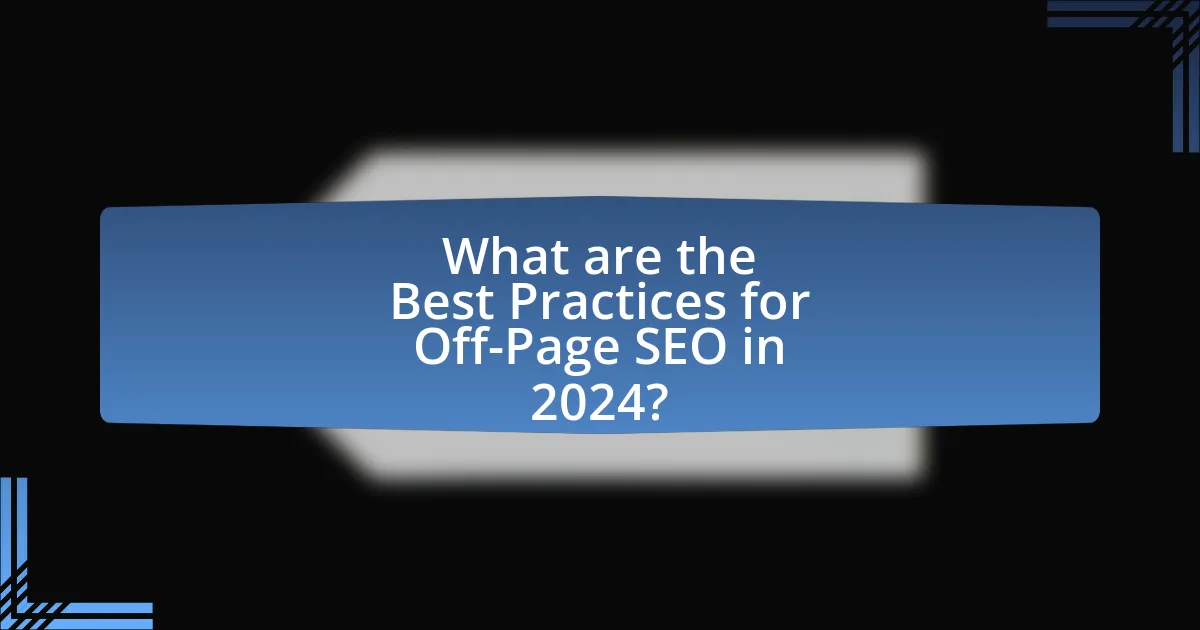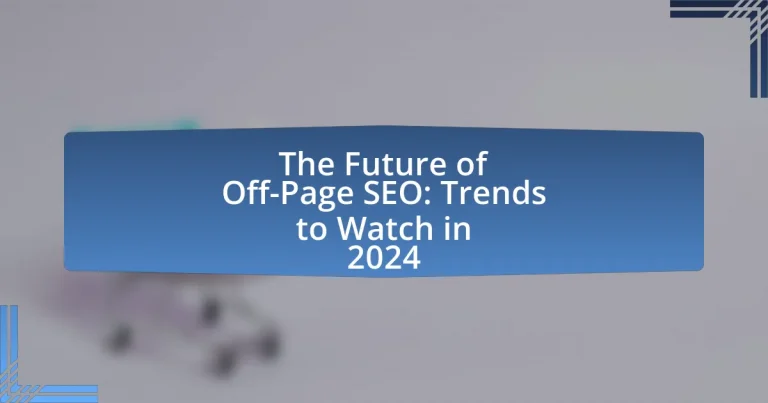The article focuses on Off-Page SEO, which encompasses strategies aimed at enhancing a website’s search engine ranking through external factors such as backlinks, social media engagement, and brand mentions. It highlights the growing importance of Off-Page SEO in 2024, emphasizing how search engines prioritize authority and trustworthiness influenced by external signals. Key components discussed include the role of backlinks, social media’s impact on visibility, and emerging technologies like AI that shape Off-Page SEO practices. The article also outlines effective strategies for businesses to improve their Off-Page SEO efforts, including content marketing and influencer collaborations, while providing metrics for measuring success and adjusting strategies based on performance data.

What is Off-Page SEO and Why is it Important for 2024?
Off-Page SEO refers to the strategies and techniques used to improve a website’s position in search engine results through external factors, primarily focusing on backlinks, social media engagement, and brand mentions. In 2024, Off-Page SEO is crucial because search engines increasingly prioritize authority and trustworthiness, which are significantly influenced by the quality and quantity of external links pointing to a site. According to a study by Backlinko, backlinks remain one of the top ranking factors, with websites in the top positions having an average of 3.8 times more backlinks than those in lower positions. This underscores the importance of Off-Page SEO in enhancing visibility and driving organic traffic in an evolving digital landscape.
How does Off-Page SEO differ from On-Page SEO?
Off-Page SEO focuses on external factors that influence a website’s ranking, while On-Page SEO pertains to elements within the website itself. Off-Page SEO includes activities like link building, social media engagement, and brand mentions, which enhance a site’s authority and trustworthiness in the eyes of search engines. In contrast, On-Page SEO involves optimizing content, HTML tags, and site structure to improve user experience and relevance. The distinction is crucial as Off-Page SEO can significantly impact a site’s visibility through external validation, whereas On-Page SEO directly affects how search engines interpret and rank the content.
What are the key components of Off-Page SEO?
The key components of Off-Page SEO include backlinks, social media engagement, and brand mentions. Backlinks, which are links from other websites to your site, significantly influence search engine rankings; studies show that websites with higher quality backlinks tend to rank better in search results. Social media engagement enhances visibility and drives traffic, as platforms like Facebook and Twitter can amplify content reach. Brand mentions, whether linked or unlinked, contribute to brand authority and can impact search engine perception, as search engines consider these signals when determining relevance and trustworthiness.
Why is Off-Page SEO crucial for search engine rankings?
Off-Page SEO is crucial for search engine rankings because it enhances a website’s authority and credibility through external signals. These signals, such as backlinks from reputable sites, social media engagement, and brand mentions, contribute significantly to how search engines evaluate a site’s relevance and trustworthiness. Research indicates that websites with a higher number of quality backlinks tend to rank better in search results, as Google’s algorithm prioritizes sites that are recognized and endorsed by others in the digital ecosystem. This correlation between off-page factors and search rankings underscores the importance of off-page SEO in achieving visibility and driving organic traffic.
What trends are shaping the future of Off-Page SEO in 2024?
The trends shaping the future of Off-Page SEO in 2024 include an increased focus on social signals, the importance of brand authority, and the rise of AI-driven content curation. Social signals, such as engagement metrics from platforms like Facebook and Twitter, are becoming crucial for search engine rankings, as they indicate content relevance and popularity. Brand authority is also gaining significance, with search engines favoring established brands that demonstrate trustworthiness and expertise in their fields. Additionally, AI-driven content curation tools are streamlining the process of identifying high-quality backlinks and relevant content, enhancing the effectiveness of Off-Page SEO strategies. These trends reflect the evolving landscape of digital marketing, where user engagement and content quality are paramount.
How is social media influencing Off-Page SEO strategies?
Social media is significantly influencing Off-Page SEO strategies by enhancing brand visibility and driving traffic through social signals. Increased engagement on social media platforms leads to higher chances of content being shared, which can result in backlinks from authoritative sites. According to a study by HubSpot, 54% of social media users utilize these platforms to research products, indicating that social media presence directly impacts search engine rankings. Furthermore, Google considers social signals as a factor in its ranking algorithms, meaning that active social media profiles can improve a website’s authority and relevance in search results.
What role do backlinks play in the evolving landscape of Off-Page SEO?
Backlinks are crucial in the evolving landscape of Off-Page SEO as they significantly influence search engine rankings and website authority. Search engines like Google utilize backlinks as a primary ranking factor, assessing the quality and quantity of links pointing to a website to determine its credibility and relevance. According to a study by Backlinko, pages with more backlinks tend to rank higher in search results, with the top-ranking pages having an average of 3.8 times more backlinks than those in lower positions. This demonstrates that as Off-Page SEO continues to evolve, the emphasis on acquiring high-quality backlinks remains essential for improving visibility and driving organic traffic.

How are Emerging Technologies Impacting Off-Page SEO?
Emerging technologies are significantly impacting off-page SEO by enhancing link-building strategies, improving content distribution, and leveraging data analytics for better audience targeting. For instance, artificial intelligence tools can analyze vast amounts of data to identify high-quality backlink opportunities, which increases the effectiveness of link-building efforts. Additionally, social media platforms are utilizing algorithms that prioritize content based on user engagement, thus influencing how content is shared and linked across the web. Furthermore, advancements in machine learning enable marketers to predict trends and consumer behavior, allowing for more strategic outreach and partnerships. These technologies collectively contribute to a more efficient and targeted approach to off-page SEO, ultimately improving website authority and visibility.
What technologies are driving changes in Off-Page SEO practices?
Artificial intelligence and machine learning are driving significant changes in Off-Page SEO practices. These technologies enhance the ability to analyze user behavior, predict trends, and optimize content for better engagement. For instance, AI algorithms can assess backlink quality more effectively, prioritizing links from authoritative sources, which is crucial for improving search rankings. Additionally, machine learning models can analyze social signals and user interactions, providing insights that help marketers tailor their outreach strategies. According to a 2023 study by Search Engine Journal, 70% of SEO professionals reported that AI tools improved their link-building efforts, demonstrating the impact of these technologies on Off-Page SEO.
How does artificial intelligence affect Off-Page SEO strategies?
Artificial intelligence significantly enhances Off-Page SEO strategies by automating link-building processes and improving content relevance. AI tools analyze vast amounts of data to identify high-quality backlink opportunities, enabling marketers to focus on strategic partnerships rather than manual outreach. For instance, AI algorithms can evaluate the authority and relevance of potential linking sites, ensuring that backlinks contribute positively to search engine rankings. Additionally, AI-driven content analysis helps in understanding audience preferences, allowing for the creation of shareable content that naturally attracts backlinks. This data-driven approach not only increases efficiency but also improves the effectiveness of Off-Page SEO efforts, as evidenced by studies showing that websites utilizing AI for SEO see higher organic traffic growth compared to those that do not.
What is the impact of voice search on Off-Page SEO?
Voice search significantly impacts Off-Page SEO by altering how content is discovered and shared online. As voice search usage increases, search engines prioritize conversational keywords and local results, which influences backlink strategies and social media engagement. For instance, a study by Google indicates that 27% of the global online population uses voice search on mobile devices, highlighting the need for businesses to optimize their content for voice queries. This shift necessitates a focus on natural language processing and user intent, leading to a more dynamic approach to Off-Page SEO that emphasizes quality backlinks from authoritative sources and increased social sharing to enhance visibility in voice search results.
How can businesses adapt to these technological changes?
Businesses can adapt to technological changes by integrating advanced analytics and automation tools into their marketing strategies. These tools enable businesses to analyze consumer behavior and optimize their off-page SEO efforts effectively. For instance, utilizing AI-driven platforms can enhance link-building strategies by identifying high-quality backlink opportunities based on real-time data. According to a report by HubSpot, companies that leverage data analytics in their marketing see a 5-10% increase in ROI. By staying updated with emerging technologies and continuously refining their SEO tactics, businesses can maintain a competitive edge in the evolving digital landscape.
What strategies should businesses implement for effective Off-Page SEO in 2024?
Businesses should implement a multi-faceted approach to Off-Page SEO in 2024, focusing on building high-quality backlinks, leveraging social media engagement, and enhancing brand reputation through online reviews. High-quality backlinks from authoritative sites improve search engine rankings, as evidenced by a study from Moz indicating that backlinks are a significant ranking factor. Social media engagement increases visibility and drives traffic, with data from Statista showing that 54% of social browsers use social media to research products. Additionally, managing online reviews can enhance brand reputation, as 93% of consumers read online reviews before making a purchase, according to a survey by BrightLocal. These strategies collectively contribute to improved search engine performance and brand authority in 2024.
How can companies leverage data analytics for Off-Page SEO success?
Companies can leverage data analytics for Off-Page SEO success by analyzing backlink profiles, social media engagement, and competitor strategies. By utilizing tools like Google Analytics and Ahrefs, businesses can identify high-quality backlinks that drive traffic and improve domain authority. For instance, a study by Moz indicates that websites with a strong backlink profile rank higher in search engine results, demonstrating the importance of targeted link-building strategies. Additionally, analyzing social media metrics helps companies understand audience preferences and optimize content for better shareability, which can enhance brand visibility and referral traffic.

What are the Best Practices for Off-Page SEO in 2024?
The best practices for off-page SEO in 2024 include building high-quality backlinks, leveraging social media engagement, and focusing on brand reputation management. High-quality backlinks from authoritative sites enhance domain authority and improve search rankings, as evidenced by studies showing that sites with more backlinks tend to rank higher in search engine results. Social media engagement increases visibility and drives traffic, with platforms like Instagram and Twitter being crucial for brand awareness and audience interaction. Additionally, managing brand reputation through online reviews and public relations is essential, as positive reviews can significantly influence consumer trust and search rankings. These practices collectively contribute to a robust off-page SEO strategy in 2024.
What are the most effective link-building strategies?
The most effective link-building strategies include guest blogging, creating high-quality content, leveraging social media, and building relationships with influencers. Guest blogging allows websites to gain backlinks by contributing articles to other sites, which can enhance authority and reach. High-quality content attracts organic backlinks as other sites reference valuable information, with studies showing that content marketing generates three times more leads than traditional marketing. Social media platforms facilitate sharing and engagement, increasing visibility and potential link opportunities. Building relationships with influencers can lead to collaborations that result in backlinks, as influencers often share content with their audiences, amplifying reach and credibility.
How can content marketing enhance Off-Page SEO efforts?
Content marketing enhances Off-Page SEO efforts by generating high-quality backlinks and increasing brand visibility. When businesses create valuable content, such as informative articles, infographics, or videos, they attract attention from other websites and influencers, leading to natural link-building opportunities. According to a study by Moz, backlinks remain a significant ranking factor, with over 50% of SEO professionals citing them as crucial for improving search engine rankings. Additionally, engaging content encourages social sharing, which amplifies reach and can lead to more organic backlinks. This synergy between content marketing and Off-Page SEO ultimately boosts a website’s authority and search engine performance.
What role does influencer marketing play in Off-Page SEO?
Influencer marketing significantly enhances Off-Page SEO by driving traffic, increasing brand awareness, and generating high-quality backlinks. When influencers share content or endorse a brand, they often link back to the brand’s website, which improves its authority and search engine rankings. According to a study by the Digital Marketing Institute, 49% of consumers depend on influencer recommendations, indicating that influencer marketing can effectively boost engagement and referral traffic. This increased visibility and credibility contribute to a brand’s overall SEO strategy, making influencer marketing a vital component of Off-Page SEO.
How can businesses measure the success of their Off-Page SEO efforts?
Businesses can measure the success of their Off-Page SEO efforts through metrics such as referral traffic, domain authority, and backlink quality. Referral traffic indicates the number of visitors coming from external sources, which reflects the effectiveness of link-building strategies. Domain authority, a score developed by Moz, helps assess the overall strength of a website’s backlink profile, with higher scores correlating to better search engine rankings. Additionally, analyzing the quality of backlinks—considering factors like relevance and authority of linking sites—provides insight into the impact of Off-Page SEO activities. These metrics collectively offer a comprehensive view of Off-Page SEO performance, enabling businesses to adjust their strategies effectively.
What metrics should be tracked for Off-Page SEO performance?
Key metrics to track for Off-Page SEO performance include backlink quality, referring domains, social media engagement, brand mentions, and domain authority. Backlink quality is crucial as it reflects the credibility and relevance of the links pointing to a website; higher quality backlinks from authoritative sites improve search rankings. Referring domains indicate the diversity of sources linking to a site, which can enhance its trustworthiness. Social media engagement metrics, such as shares and likes, demonstrate content reach and influence, impacting visibility. Brand mentions, both linked and unlinked, contribute to brand awareness and can influence search engine perception. Lastly, domain authority, a score developed by Moz, predicts how well a website will rank on search engines, making it a vital metric for assessing overall Off-Page SEO effectiveness.
How can businesses adjust their strategies based on performance data?
Businesses can adjust their strategies based on performance data by analyzing key metrics to identify strengths and weaknesses in their current approach. For instance, if a business observes a decline in website traffic from specific off-page SEO efforts, it can pivot its strategy by reallocating resources to more effective channels, such as social media or influencer partnerships. Data-driven decisions, supported by analytics tools like Google Analytics, enable businesses to track user engagement and conversion rates, allowing for timely adjustments. Historical data shows that companies leveraging performance metrics can improve their ROI by up to 20%, demonstrating the effectiveness of data-informed strategy adjustments.
What practical tips can help improve Off-Page SEO in 2024?
To improve Off-Page SEO in 2024, focus on building high-quality backlinks through guest blogging, influencer collaborations, and content marketing. High-quality backlinks from reputable sites enhance domain authority and search engine rankings. For instance, a study by Moz indicates that backlinks are a significant ranking factor, with sites in the top positions having an average of 3.8 times more backlinks than those in lower positions. Additionally, engaging in social media marketing can amplify content reach and drive traffic, as platforms like Facebook and Twitter are crucial for brand visibility and audience engagement.


